-
-
- Yamini Narayanan, PhD, Deakin University Melbourne, Faculty of Arts & Education (Mar. 16, 2021)
- Lynne Jackson, PhD, King’s University College, University of Western Ontario, Psychology (Feb. 16, 2021)
- Stefan Dolgert, PhD, Brock University, Associate Professor, Dept. of Political Science (Jan. 19, 2021)
- Evan Maina Mwangi, PhD, Northwestern University Weinberg, English and Comparative Literary Studies (Nov. 18, 2020)
- Lindgren Johnson, PhD, University of Virginia, Assistant Professor, Department of English (Oct. 21, 2020)
- Alexandra Isfahani-Hammond, PhD, University of California San Diego, Associate Professor Emeritx of Comparative Literature and Luso-Brazilian Studies (Sept. 16, 2020)
- Annual Lecture in Animal Rights Law and Policy, Professor Angela Fernandez, University of Toronto Faculty of Law (Oct. 5, 2020)
-
** Missed the lecture? View our Video Gallery of Past Lectures
 Animating Caste: Visceral Geographies of Pigs, Caste, and Violent Nationalisms in Chennai City
Animating Caste: Visceral Geographies of Pigs, Caste, and Violent Nationalisms in Chennai City
-
- Senior Lecturer, Faculty of Arts and Education
- Deakin University, Melbourne
- Tuesday, Mar. 16, 2021. 12:30 – 1:50 p.m. (Pacific)
- Via Zoom webinar (free).
Watch the Video
-
Download the Lecture Poster
“Running with Horses: Reflections on the Psychology of Speciesism”
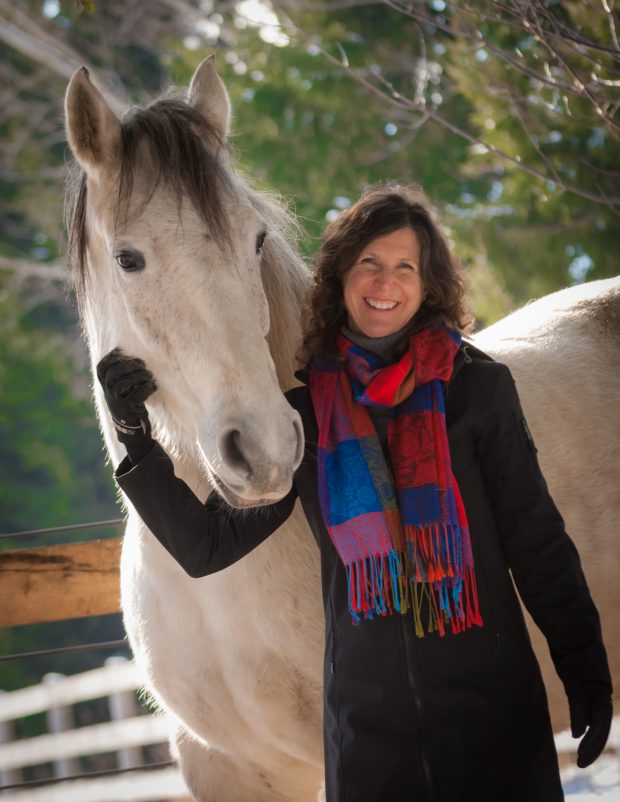
Image: Steve Grimes, “Lynne and Numa,” King’s University College. -
- Lynne Jackson, Ph.D.
- Associate Professor, Dept. of Psychology
- King’s University College, Western University
- Tuesday, Feb. 16, 2021. 12:30 – 1:50 p.m. (Pacific)
While running with my horses, rather than riding on them, I experienced moments of absorption in a sense of “we.” Prompted by that observation, I will reflect on my and others’ research on human intergroup attitudes and speciesism, and offer ideas about the sources of and solutions to the attitudinal component of speciesism. In particular, I will propose that because the way that we perceive and respond to the other is embedded in power relations, strategies to reduce human prejudice can be most effectively applied to interspecies relations if they address this element of context.
Lynne Jackson is an Associate Professor of Psychology at King’s University College at the University of Western Ontario, where she researches and publishes about psychological dimensions of issues of social justice. Her work on human intergroup attitudes and relations has recently been extended to address the related problems of environmental inequality and speciesism. She is author of The Psychology of Prejudice: From Attitudes to Social Action, Second edition (APABooks), and can be reached at lynne.jackson@uwo.ca.
Watch the Video
-
-
Download the Lecture Poster
“Alien Athena: Reclaiming Our Posthuman Past”
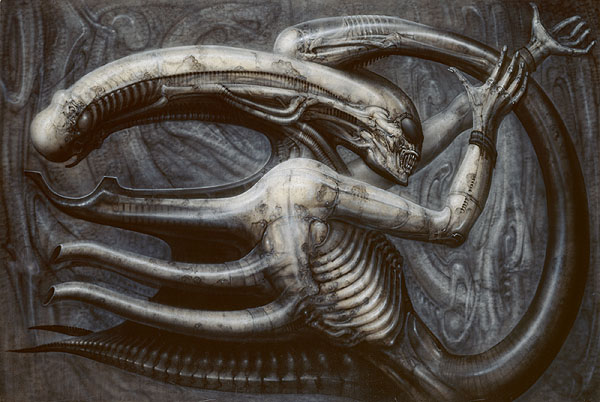
H.R. Giger, “Necronomocon IV.” Print. 1976. -
- Stefan Dolgert, PhD
- Associate Professor, Political Science, Brock University
- Tuesday, Jan. 19, 2021. 12:30 – 1:50 p.m. (Pacific)
If you’re concerned with animal exploitation and ecocide in the present, it might seem strange to suggest we should be spending our time thinking about the ancient Greeks. Aren’t they (“This is Sparta!”) part of the problem with “Western Civilization” and its androcentric speciesism? In my talk I will argue exactly the opposite: that far from being our enemies, the texts of canonical ancient thinkers like Homer and Plato are not only non-anthropocentric, but also strategically useful in crafting political solutions for combating the horrors of the Anthropocene. Drawing methodological inspiration from posthuman cyborg theory, Afrofuturism, and biomimetics, I contend that the way forward to “zoopolis” is precisely through a reclamation of the lost possibilities of our past.
 Stefan Dolgert is Associate Professor of Political Science at Brock University, where he writes and teaches on democratic theory, critical animal studies, posthumanism, hip-hop, and ancient Greek and classical Chinese political thought. He is currently finishing a manuscript on the rich tradition of non-anthropocentric thought in ancient Greece, and can be reached at sdolgert@brocku.ca.
Stefan Dolgert is Associate Professor of Political Science at Brock University, where he writes and teaches on democratic theory, critical animal studies, posthumanism, hip-hop, and ancient Greek and classical Chinese political thought. He is currently finishing a manuscript on the rich tradition of non-anthropocentric thought in ancient Greece, and can be reached at sdolgert@brocku.ca. -
Watch the Video
-
Sexuality and African Animalities

Wangechi Mutu, “Even My Old Soul Has An Old Soul.” Ink and watercolor on Mylar, 2019. Copyright Wangechi Mutu. Courtesy the artist and Gladstone Gallery, New York and Brussels. -
- Northwestern University Weinberg, English and Comparative Literary Studies
- Author of The Postcolonial Animal: African Literature and Posthuman Ethics (Michigan, 2019).
- Wednesday, Nov. 18, 2020. 12:30 – 1:50 p.m.
- Via Zoom webinar (free).
Drawing on Frantz Fanon, Wangari Maathai, and Harry Garuba, this talk examines the interface of animality in African art and ideas on non-normative sexualities. I examine the works of Besi Head, Wangechi Mutu, Jim Chuchu, Saida Hagi-Dirie Herzi, Ngugi wa Thiong’o, Nuruddin Farah, and Shaaban bin Robert, among others. I argue that the artists, in their different ways, urge the society to let animals flourish while summoning the figure of the animal to disrupt oppressive practices within the human society.
 Evan Maina Mwangi is professor of English at Northwestern University, USA, and Professor Extraordinaire of English at Stellenbosch University, South Africa. His most recent publications include Translation in African Contexts: Postcolonial Texts, Queer Sexuality, and Cosmopolitan Fluency (2017) and The Postcolonial Animal: African Literature and Posthuman Ethics (2019). He is at work on a monograph on Animality in Indian Ocean cultures.
Evan Maina Mwangi is professor of English at Northwestern University, USA, and Professor Extraordinaire of English at Stellenbosch University, South Africa. His most recent publications include Translation in African Contexts: Postcolonial Texts, Queer Sexuality, and Cosmopolitan Fluency (2017) and The Postcolonial Animal: African Literature and Posthuman Ethics (2019). He is at work on a monograph on Animality in Indian Ocean cultures.Co-sponsored by:
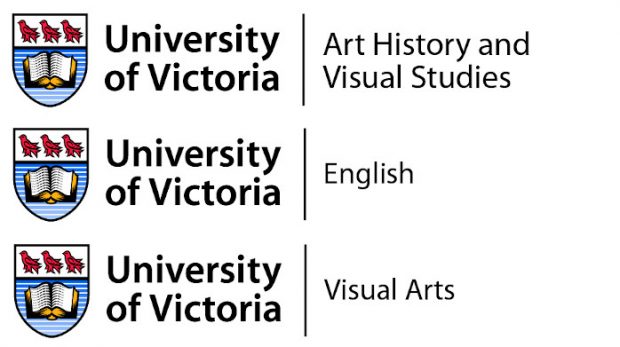
 Thinking Violence in Femivorism and Veganism:
Thinking Violence in Femivorism and Veganism: The ‘Authenticity’ of Unethical Violence in Camas Davis’ Killing It and The Exploitation of ‘Blood-Thirsty’ Vegan Violence in E.B. White’s Charlotte’s Web“
-
- Lindgren Johnson, PhD
- Assistant Professor, University of Virginia, Department of English
- Author of Race Matters, Animal Matters: Fugitive Humanism in African America, 1840-1930 (Routledge, 2018)
- Wednesday, Oct. 21, 2020. 12:30 – 1:50 p.m.
- Via Zoom webinar (free).
The vegan struggle to think and act nonviolently exists in relation to the difficult reality of violence from which we cannot remove ourselves. Does more attention need to be given to this violence, then, not as a reality to be resisted but, rather, as a foundation from which to struggle—and to think vegan? I consider this question by way of E.B. White’s Charlotte’s Web (1952) and Camas Davis’ Killing It: An Education (2018).
 Lindgren Johnson is an assistant professor of English at the University of Virginia and the author of Race Matters, Animal Matters: Fugitive Humanism in African America, 1840-1930 (Routledge 2018), which illuminates pivotal moments in African American literature that resist white supremacy’s violent animalization of both animals and blacks. “Fugitive humanism” conceives black liberation as one necessarily in intimate alliance with nonhuman animals, providing potentially prophetic frameworks for panoramic liberation and current vegan theory. This talk for ASRI marks the beginning of work that is thinking through how and why violence against animals has moved into the realm of “the sacred” in supposedly progressive, secular rhetoric—and how veganism should respond.
Lindgren Johnson is an assistant professor of English at the University of Virginia and the author of Race Matters, Animal Matters: Fugitive Humanism in African America, 1840-1930 (Routledge 2018), which illuminates pivotal moments in African American literature that resist white supremacy’s violent animalization of both animals and blacks. “Fugitive humanism” conceives black liberation as one necessarily in intimate alliance with nonhuman animals, providing potentially prophetic frameworks for panoramic liberation and current vegan theory. This talk for ASRI marks the beginning of work that is thinking through how and why violence against animals has moved into the realm of “the sacred” in supposedly progressive, secular rhetoric—and how veganism should respond.
 Akbar Broke My Heart: Brazilian Zooliterature in a Relational Frame
Akbar Broke My Heart: Brazilian Zooliterature in a Relational Frame- Alexandra Isfahani-Hammond, PhD
- Associate Professor Emerita of Comparative Literature and Luso-Brazilian Studies
- University of California San Diego
- Lecture co-sponsored by the Department of English and the Centre for Global Studies
- Wednesday, September 16th
Annual Lecture in Animal Rights Law and Policy:
“The Capture Rule and the Quasi-Property Status of Farmed Fishes”
Angela Fernandez, Faculty of Law, University of Toronto
- Hosted by the Faculty of Law, University of Victoria
- Monday, October 5, 12:30 – 1:20 p.m., PST
There are multiple possible legal statuses for nonhuman animals beyond the traditional distinction between property and persons – no status at all, a full property status, a quasi-property status (based on a recognition of sentience), and a status of persons/beings. This talk explores the quasi- property status of farmed fishes, nonhuman animals that are sentient, and so should not be treated as property, as if they are the same as inanimate property, but have few if any legal protections against unnecessary and cruel treatment.
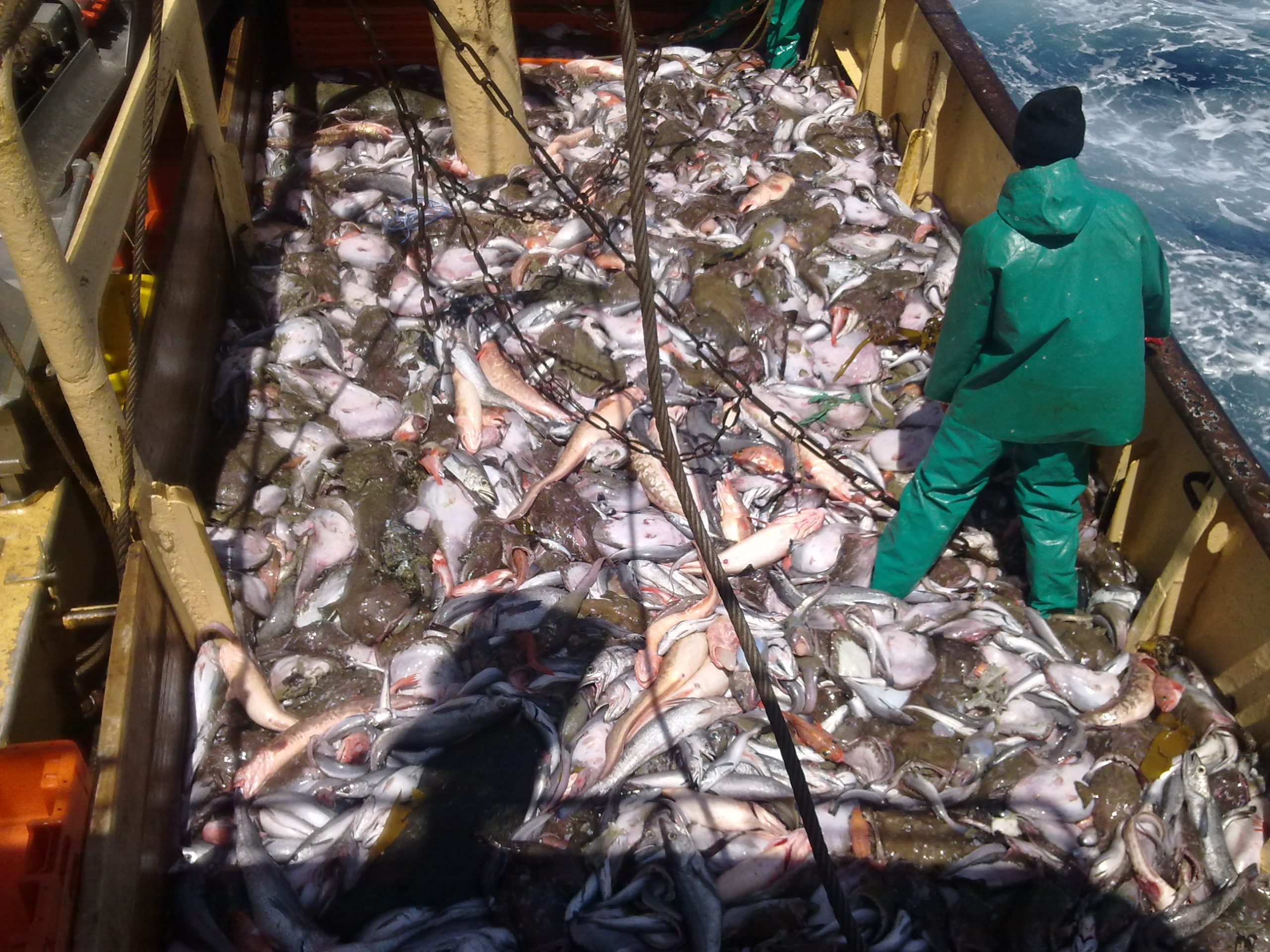
Aboard the trawler African Queen, 2011. Image CC0. Farmed animals generally are quasi-property/quasi-persons in the sense that their sentience sets them apart from inanimate property and they have rights against unnecessarily cruel treatment, even if those rights are read down in practice to (anemic) industry standards and are regularly under-enforced or not enforced at all. Fishes seem to have no rights at all under animal protection or animal welfare statutes. However, I will argue in this talk that unlike the usual situation in which animal advocates want to argue against any kind of property status for nonhuman animals, the problem of the escaped or feral farmed fish provides an example in which their quasi-property status continues to be important in terms of keeping them and any damage they do connected to the farm that produces them, even if that farm does not own them in the sense of having legal title to them given the common law capture rule.
 Angela Fernandez is Professor of Law at the Faculty of Law and Department of History at the University of Toronto. She is a fellow with the Oxford Centre for Animal Ethics, a member of the Board of Advisors and Board of Directors for Animal Justice Canada, and a member of the Brooks Animal Studies Academic Network (BASAN) with the Brooks Institute for Animal Law and Policy. Her publications include a book on the (in)famous early nineteenth-century first-possession foxhunting case from New York that established the capture rule for wild animals Pierson v. Post, the Hunt for the Fox: Law and Professionalization in American Legal Culture (New York; Cambridge: Cambridge University Press, 2018).Her animal law publications include “Not Quite Property, Not Quite Persons: A ‘Quasi’ Approach for Nonhuman Animals,” 5 Canadian Journal of Comparative and Contemporary Law (2019): 155-232 in a special issue “Beyond Humanity: New Frontiers in Animal Law.”
Angela Fernandez is Professor of Law at the Faculty of Law and Department of History at the University of Toronto. She is a fellow with the Oxford Centre for Animal Ethics, a member of the Board of Advisors and Board of Directors for Animal Justice Canada, and a member of the Brooks Animal Studies Academic Network (BASAN) with the Brooks Institute for Animal Law and Policy. Her publications include a book on the (in)famous early nineteenth-century first-possession foxhunting case from New York that established the capture rule for wild animals Pierson v. Post, the Hunt for the Fox: Law and Professionalization in American Legal Culture (New York; Cambridge: Cambridge University Press, 2018).Her animal law publications include “Not Quite Property, Not Quite Persons: A ‘Quasi’ Approach for Nonhuman Animals,” 5 Canadian Journal of Comparative and Contemporary Law (2019): 155-232 in a special issue “Beyond Humanity: New Frontiers in Animal Law.”
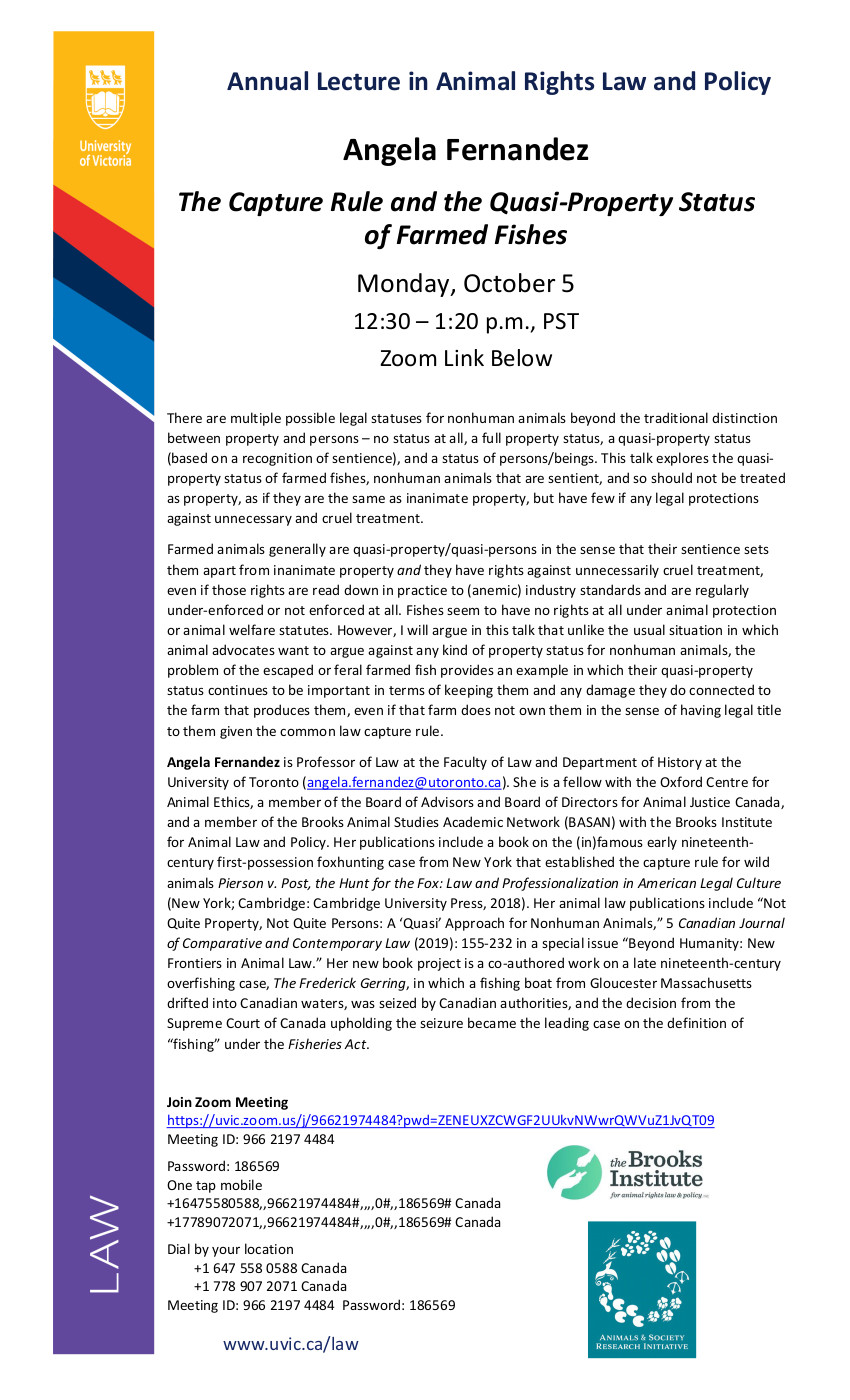 Her new book project is a co-authored work on a late nineteenth-century overfishing case, The Frederick Gerring, in which a fishing boat from Gloucester Massachusetts drifted into Canadian waters, was seized by Canadian authorities, and the decision from the Supreme Court of Canada upholding the seizure became the leading case on the definition of “fishing” under the Fisheries Act.
Her new book project is a co-authored work on a late nineteenth-century overfishing case, The Frederick Gerring, in which a fishing boat from Gloucester Massachusetts drifted into Canadian waters, was seized by Canadian authorities, and the decision from the Supreme Court of Canada upholding the seizure became the leading case on the definition of “fishing” under the Fisheries Act.Download poster PDF
Prior Year: 2019-2020 ASRI Events
-



